The market is currently overflowing with high quality compact digital cameras. The better the news when a new model is introduced, having the characteristics and features that can shuffle the stable positions of cameras in this product segment. If you think you’ll find one of the leading brands in photography labeled on the body of this camera, you are mistaken – this camera is manufactured by the Korean Samsung.
When we’re at it, let’s stick with the Samsung brand for a moment. Despite being labeled as a cell phone and refrigerator manufacturer, Samsung is no rookie in the field of photography. It has been producing cameras since the 80s of last century, establishing deals of cooperation with renowned optics manufacturer Schneider-Kreuznach or the Porsche designer studio. Samsung had not missed out on the arrival of digital technology either, as you may have noticed on the Week of Life website – we have introduced some of these fascinating cameras in the past.
With its newest digital compact camera – model EX1 – Samsung has advanced to the ranks of the elite category, in which you can find the best digital compacts available on the market today. We have brought you reviews of the Canon PowerShot S90 or Canon PowerShot G11 , as well as the older Leicu D-Lux 4.
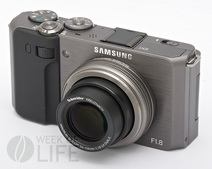 |
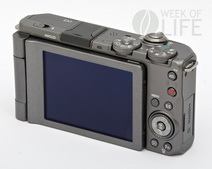 |
So here you have a slightly larger digital compact (for instance, the body is as wide as it is in the case of Olympus Pen E-PL1) in its basic design with dominating sharp edges. You can purchase Samsung EX1 in black or in dark silver with a titanium feel to it – see the tested piece. The body is metallic, or rather has a metallic ‘crust’ and the factory manufacturing is exemplary – all parts stay in alignment and the control buttons have a clear detent.
As a compact camera belonging to the highest class, the EX1 is equipped with a large quantity of control elements – a hot shoe for an external flash, a lens thread or an articulated display. The pride of this camera is by all means the ultra-wide lens Schneider-Kreuznach Varioplan 24–72 mm F1.8–2.4. Simply speaking, no other camera in the same class can match the lens speed of the Samsung EX1.
 |
||||||||||
|
||||||||||
Viewfinders are slowly becoming extinct when it comes to digital compacts, with large displays on the back of the cameras assuming their role. In the case of the EX1 model, Samsung went all out and used a 3” AMOLED display (you can find more about the display in the Samsungu NX1 review) with a high VGA resolution. On top of that, the display is articulated, a great feature allowing for photographs to be taken from almost any position.
 |
||||
|
In correlation with the display, the menu has everything a person could ask for. It’s very well graphically designed, supplemented with a simple animation, as well as transparent and logically arranged. The Fn. button offers quick access to the most important parameters.
As an advanced digital compact camera, the Samsung EX1 is equipped with various control buttons with direct access to functions. On the camera’s front is a mode dial embedded into the hand grip; the rear control dial is around the d-pad.
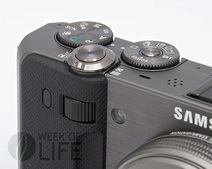 |
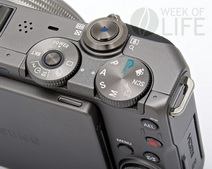 |
There are two control dials on top of the camera, including one for the conventional mode settings and the second for setting the Drive mode – single frame, continuous, self-timer, exposure bracketing.
The right rear side of the camera is of typical design; perhaps the only thing worth mentioning is the dedicated video-recording button, which is becoming an increasingly popular feature.
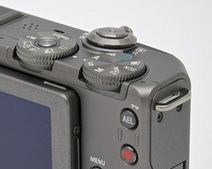 |
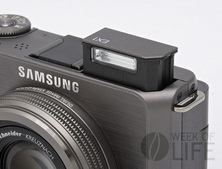 |
One of the features resembling the competing Leica D-Lux 4 (or Panasonic Lumix DMC-LX3) is the built-in pop-up flash, which needs to be activated manually with the switch at the top of the camera. The internal flash is weak (Guide number not specified), but can be used on many occasions in combination with the high brightness of the lens. Alternatively, in bad light conditions, users have the ability to attach an external flash on the hot shoe.
Screenshots of the menu of Samsung EX1
 |
 |
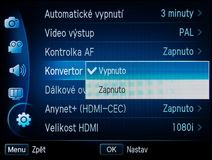 |
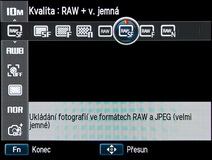 |
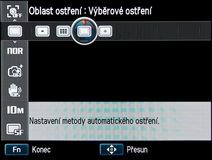 |
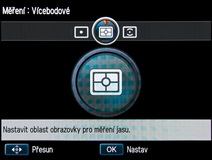 |
Overall evaluation
As far as the design and controls go, the Samsung EX1 is near flawless. The only thing that can be a little irritating for the user is the fact that the histogram disappears when setting exposure compensation. Apart from that, the camera is intuitive and easy to use. Regarding speed, frankly it is a little disappointing – the camera takes time to load when turned on and the same applies when saving images in the RAW format. Fortunately, it focuses quite well considering the average speed of cameras in its class.
Image quality can be regarded as excellent. The lens keeps the images smooth in its widest angle and defects such as color aberration are almost inexistent. Up to 800 ISO, noise is easily corrected, but be aware that the image quality will deteriorate with higher sensitivity values.
The biggest problem is the sensitivity of the lens in its widest angle when dealing with contre-jour light. The anti-reflective layers are most probably weak, meaning that any kind of backlight will cause problems and create an unwanted lens flare (loss of contrast) on the final image. Perhaps a lens hood would be helpful in this case, this accessory is however not included in the basic kit.
Common Price (at the time of this review being published): $369.00 (body only)
Basic Technical Data for Samsung EX1
Sensor
CCD 10 Mpx, 1/1.7″
10 Mpx (3 648 × 2 736 px)
Light sensitivity ISO 80 to 3 200
Optics
24–72 mm F1.8–2.4
Stabilized optics
Memory medium
SD/SDHC, 24 MB internal memory
Data formats
Image: JPEG, SRW
Video: MP4
Video
640 × 480 px, 30 or 15 fps
320 × 240 px, 30 or 15 fps
Mono sound
LCD
AMOLED
Screen size 3“
614 000 px
Power supply
Li-Ion battery
Dimensions and weight (body only)
6.1“× 2.56“× 1.81“inches (w × h × d)
11.8 oz. (incl. battery and memory card)
 |
 |
 |
 |
 |
 |
 |
 |
 |
 |
 |
 |
 |
 |
 |
